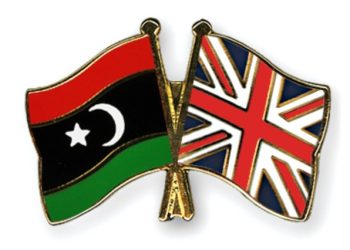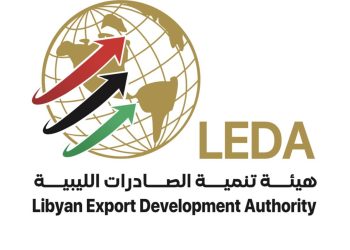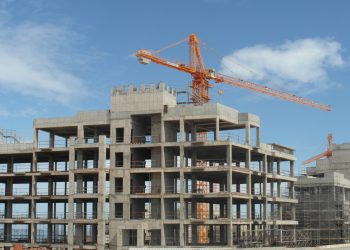By Sami Zaptia.

London, 10 July 2020:
Speaking during a Libyan British Business Council (LBBC) webinar Wednesday on Libya’s banking system, chairman of the private sector Libyan bank, Assaraya Trade and Investment Bank (ATIB), Naaman El Bouri warned that Libya’s banking system was on the verge of collapse if the political split status quo continues.
He admitted that Libya’s banks have not played a role in developing the country’s economy. He attributed this to the legacy of Qaddafi-era laws that restricted their role, such as the law that transferred ownership of homes from their legal owner to their occupier and the laws that prevent banks from seeking legal redress to recover mortgaged homes or loans.
He also blamed the lack of clear planning laws that define land that is agricultural and land that is commercial and ripe for construction.
For example, he revealed that Libya’s banks have a LD 17 bn loan portfolio, 63 percent of which is to the private sector and 36 percent of which is to the state sector. He reported that 21 percent of loans are unlikely to be recovered – which is high compared to the international standard of 5 percent.
With regards to private banks, El Bouri pointed out that government institutions by law must operate with government banks – which deprives private sector bank from growth and warps the market into the direction of state sector banks.
Despite this, El Bouri says private sector banks have managed to attract private money and grow. He puts this to the fact that they are more agile, are eager and able to change, invest heavily in new technology and provide better service. They do not enjoy a monopoly on their clients and have to compete for their custom – unlike the state sector banks.
The Qaddafi-era regulations that prevent banks from taking legal measures to recover loans has led to a poor return on assets for Libyan banks of just 0.5 percent. Return on equity is at a comparable rate to regional standard of 8.4 percent. Their solvency at 10.7 percent is also comparable to the Basel 10 percent standard.
Libya’s 2014 political split is damaging banking sector
Libya’s banking sector took a nose-dive after Libya’s 2014 political split which led to the split of its Central Bank of Libya (CBL) into a Tripoli and Beida branch in the east.
As the newly elected parliament of 2014 and its legitimate and internationally recognized government at the time fled to eastern Libya – while an unrecognized Government of National Salvation was created in Tripoli – the Tripoli CBL sided with the de facto government it was under.
As a result of this split and political and legitimacy vacuum, in practical terms, the CBL Tripoli took over the roles of the Ministries of Finance and Economy. Banks became mere post offices, El Bouri said.
The Tripoli CBL was unable to decree a monetary decision – which is within its competency – to devalue the Libyan dinar, as such a decision requires a board meeting. Four of its current board members are aligned with the eastern CBL branch.
The Tripoli CBL started to use an internal committee to allocate the opening of Letters of Credit (LCs). This opened both the process and the Tripoli CBL to abuse, corruption and the politicization of the process.
The foreign currency sale surcharge
In September 2018 as part of a reform process, a surcharge was agreed with the internationally recognized Faiez Serraj-led Libyan government in Tripoli. It was initially set at 183 percent.
The foreign currency surcharge was initially meant to cover the country’s mounting deficit, but in reality, the Tripoli government used most of it to finance its budge, El Bouri explained.
El Bouri revealed that Libya needs about US$ 6 bn per year or about US$ 600 per month for its imports and that the CBL insists that imports paid for only through LCs. This precludes small business who buy their hard currency in the black-market. This perpetuates black market demand and supply for hard currency and keeps the black-market exchange rate high.
Today, due to the oil blockade in place since January, Tripoli CBL has reduced the list of goods that can be imported to foods and medicines. This means hard currency for all other imports has to be sourced and supplied through the black market.
Yet, El Bouri points out, despite a reduced list of items that the CBL is prepared to allow LC’s for, Libya’s monthly LC bill has shot up to US$ 1.1 bn per month. This 80 percent increase for only 30 permitted products raises question marks on Tripoli CBL’s LC opening process. Where is the increase of 80 percent in monthly hard currency LCs going to? As a result of the reduction in what LCs are opened for – the black-market exchange rate for the dollar has shot up to around LD 8 per dollar.
The overnight decision to introduce Islamic banking
In January 2013, the then parliament of Libya, the National Transitional Council (NTC), decreed Law No. 1 of 2013 introducing Islamic banking in Libya to be implemented immediately. This law, El Bouri said, brought Libya’s banking sector to a halt. He explained that Libya’s banks were not ready for the immediate implementation of Islamic banking. They hade no capacity, human resources, know-how, the necessary by-laws, systems or accounting standards.
This law is still affecting Libya’s banking sector today and is one of the reasons why bank’s earnings have dropped from 21 percent to today’s 8 percent. The eastern-based House of Representatives, still Libya’s internationally recognized parliament, did issue a law in 2016 postponing the NTC’s Law No. 1 to 2020 – but due to the political split, Tripoli CBL ignored the law.
Looking forward, El Bouri hopes that once stability is restored in Libya the country will move to a dual system allowing banks the time to adjust and for the consumer to choose. He noted that only the Islamic Republic of Iran and Sudan had purely Islamic banking systems – countries that he did not view as setting the standard for reforming Libya’s banking system.
The bank settlement system
One of the other major challenges to Libya’s banking system is the closure by Tripoli CBL of the bank settlement system with the east.
As a result of the 2014 split, the Tripoli CBL ceased to finance the spending of the eastern-based Libyan government. To finance itself, the eastern ‘‘Interim’’ Libyan government, recognized by the HoR, borrowed LD 1.5 bn from three leading state Libyan banks headquartered in the east: Wahda, National Commercial Bank and the Bank of Commerce and Development.
The loan was in the form of a one-year bond with a 5 percent coupon offered by the eastern CBL which the bank purchased. The bonds were for one year and the idea was that the political division would be resolved within the year. It was not, and the eastern government defaulted on the bonds as it did not have any other income to cover the bonds. As a result, the eastern government decided to buy the bonds in order to save the three banks from going under. The government now became the lender.
Bonds continued to be issued by the CBL in the east to finance the activities of the eastern interim government – but the CBL in Tripoli refused to recognize these ‘deficits’. It told all the eastern-headquartered banks that it did not recognize these deposits. As the eastern banks could only get hard currency from CBL Tripoli, and it refused to accept their deposits in the east – they were forced to use up their reserves in the west.
Today, one of the eastern-headquartered banks, the National Commercial Bank (NCB), Libya’s second largest bank, is unable to provide settlement for any of their cheques through their Tripoli CBL account and it is not able to feed it from its eastern deposits. This situation is putting the whole Libyan banking system in danger, El Bouri warned. This also applies to Tripoli-headquartered banks. Even its largest bank – Jumhouria bank – is now feeling the pinch, El Bouri warned.
The real story of the Russian printed money
With regards to the money printed by the eastern CBL in Russia, El Bouri explained that the east had no choice. It was an existential decision as the Tripoli CBL had stopped transferring liquidity to the east. Tripoli feared the Khalifa Hafter’s Libyan National Army (LNA) would get its hands on this money but El Bouri asked how did the Tripoli CBL expect the 30 percent of Libyans living in the east to survive without liquidity?
He also pointed out that the eastern CBL had first approached De La Rue for the supply of cash it was about to deliver to Tripoli as part of an existing contract. When it refused it approached France which initially agreed but then under US and international pressure declined. It then approached Germany which also initially agreed only to decline under similar political pressure.
El Bouri concluded that it was the international community’s actions that forced the eastern CBL into the arms of Russia.
Today, he explained, the cash crisis in the east is exacerbated as the public their refrain from depositing their money into their banks – preferring to hoard them at home as was the case in Western Libya prior to the reforms of 2018 that reduced the cash crisis there.
As a result, money is today being physically transported in trucks and cars from eastern Libya to the west to be deposited into western bank branches in order for easterners to be able to open LCs. This will only push the east into printing even more money in Russia, he warned. Already, he pointed out, that the differential premium between cash and cheques in the east has risen by 10 percent – as had been the case in the west during the cash crisis when it reached 40 percent.
The Russian money is legal
El Bouri also clarified that the Russia-printed money was not fake nor illegal tender. He reminded that four CBL board members (the majority of the seven-person CBL board) are aligned with the eastern CBL and that they had approved the decision to print money in Russia.
Moreover, the money is freely exchanged across Libya, including Tripoli and by all banks – east, west and south. All banks, including his bank, have it in the millions in their banks’ vaults – all LD 14 billion of it!
El Bouri warned that this issue needs to be resolved if Libya’s banking system is to be saved and the country’s unity maintained. He warned that this crisis and its ensuing negative consequences will provide a fertile ground for the east’s separatists – leading to Libya’s breakup.
The reunification of the CBL board of directors
While El Bouri admitted that a unified CBL board of directors is the basis of any future Libyan monetary reforms and economic progress, talk of reunifying the current board is unrealistic. They are too polarized and can no longer work together. They are not willing to put their differences aside – he felt. ‘‘We should forget yesterday and look forward to tomorrow’’, he added.
El Bouri feels that it is time to choose a new CBL board but unfortunately this is hampered, hemmed in by the prerequisites of the Skhirat 2015 Libyan Political Agreement. This prescribes that such a major sovereign decision must be taken consensually between the eastern HoR and the High State Council (HSC). But consensus between these two is ‘‘another mission impossible’’, he added.
His only hope is that just as the international community were able to put the Faiez Serraj-led Presidency Council and High State Council together and give them international recognition, they can persuade the HoR and HSC to come up with a compromise.
He reminded that the HoR had unilaterally sacked Tripoli CBL Governor on more than one occasion and appointed his replacement Mohamed Shukri – but this was not implement nor accepted by the international community as it was done by the HoR without consulting the HSC and hence outside the terms of the LPA.
El Bouri hopes maybe the international community can persuade the HoR to allow the HSC to nominate the CBL’s Deputy Governor and that this would be the compromise solution. He said if there is the intention to find a solution it can be done as there are a hundred ways the problem could be solved. However, he fears that there is no real interest in unifying the CBL – by both sides – and that neither side really wants a UN audit of their books. El Bouri also believes that CBL board unification can be achieved without a wider Libyan political settlement.
The real causes of Libya’s war: money
El Boury is of the view that Libya’s wars since 2011 have been overwhelmingly because of money – and specifically hard currency and access to the preferential exchange rate at the exclusive power of the Tripoli CBL. The excuses of political alignment and philosophy are just fig leaves he feels.
The proposed NOC escrow account solution
On the proposed NOC suggested escrow account solution to get Libya’s oil pumping and resume its exports, El Bouri felt it was a good idea as it would save the oil sector from further deterioration, and not lose Libya potential earnings. He explained, contrary to much media hype, that any oil revenues under this agreement would be frozen in a NOC-controlled account until the political differences are resolved. They would not be distributed across the regions in some new equitable formula.
In conclusion, El Bouri said Libya’s banking sector needs a unified exchange rate and the reactivation of the bank settlement system which can act as the pillars for the reunification of Libya’s banking system – and maybe Libya itself.
An overview of Libya’s banking sector in figures:
- Libya has 19 commercial banks – including a local branch of its Libya Foreign Bank (LFB)
- They have a total of 543 branches
- Employing around 19,000 workers
- The sector is undercapitalized with a capitalization of LD 4bn – approximately US$ 1bn
- It has LD 112 bn in assets
- And deposits of LD 86 bn
- 87 percent of which are current accounts
- 12 percent of which are time deposits
- And less than 0.5 percent are savings accounts
- 52 percent are private accounts
- 48 percent are public money
- Of which 29 percent is government money
- LD 11 bn is government money






